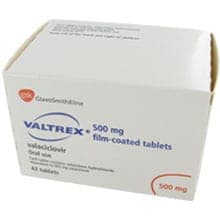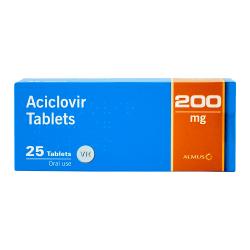Login to your account
- Prescription included
- Genuine medication
- All-inclusive service - No hidden fees
- Free next-day delivery
Cold Sores
Get cold sores treatment with an online prescription
Cold sores are a common skin condition that is estimated to affect over 60% of the world’s population. It is caused by the herpes simplex virus which can be spread through skin-to-skin contact.
Although you cannot fully cure the virus, you can manage symptoms and outbreaks with antiviral treatment which is available to purchase online here at euroClinix
Available Treatment(s)

- Works quickly for symptomatic relief from cold sores, genital herpes and shingles
- Can be taken as a preventative treatment for cold sores and genital herpes
- Easy to take tablet form

- Effectively treats herpes outbreaks
- For genital herpes, cold sores and shingles
- Easy-to-take tablets
What are cold sores?
Cold sores (herpes labialis) are a result of a common and contagious viral skin condition, caused by the herpes simplex virus. They are fluid-filled blisters that normally occur on the lips and around the mouth but can appear on the chin, cheeks, nose and inside of the mouth in rare cases. It can also cause some complications, and potentially spread to the fingers and across the skin.
Cold sores are often confused for mouth ulcers, sometimes referred to as canker sores, but canker sores normally develop inside the mouth (on the gums, the lining of the mouth or tongue) and are not the result of a viral infection. If you’re not sure, you can get your symptoms diagnosed by a swab test of the sore, but a doctor or healthcare professional can usually diagnose it just by looking at it.
Most people contract the cold sores virus when they’re younger and it stays in your body for the rest of your life. This is true of other herpes viruses such as genital herpes (herpes simplex virus type 2, HSV-2) and herpes zoster, which causes shingles. Symptoms normally occur in multiple stages, that can sometimes last for up to 10 days to 2 weeks.
What causes cold sores?
Cold sores are caused by a specific strain of the herpes simplex virus, known as type 1 (HSV-1), whilst type 2 causes genital herpes (HSV-2). Once you catch the virus, it lies dormant in the skin’s nerve cells for the rest of your life. This is because your immune system, your body’s natural defences, effectively fights off the virus to keep it inactive.
A cold sore outbreak is then triggered when your body can’t naturally keep the virus at bay, and this is usually due to your immune system being weakened in some way.
Cold sores triggers include:
- tiredness or fatigue
- colds, illness and other infections
- skin injury
- changes in weather (cold weather, winter wind and dry air)
- sunlight exposure
- hormonal changes, such as during menstruation in women
You are also more likely to experience frequent cold sores outbreaks if you are immunocompromised or have another long-term condition, such as if you:
- have HIV or AIDS
- have atopic dermatitis (eczema)
- are taking immunosuppressant, such as for cancer treatment or to prevent organ rejection after a transplant
- are pregnant or have a newborn
How do you get cold sores?
You can get the virus that causes cold sores by coming in direct or close contact with the affected area. Even when the symptoms aren't yet visible, it is contagious from the moment you feel symptoms developing (a tingling or burning sensation) up until when the sores scab and heal.
The virus is spread through touch, the most common way being kissing a person with active symptoms. As genital herpes is also caused by the herpes simplex virus, it is also possible to get cold sores by performing oral sex from a person who is displaying active genital herpes symptoms. This means you can also give someone genital herpes from receiving oral sex from someone with active cold sores symptoms.
What are the symptoms of cold sores?
The first sign of an outbreak, known as the prodromal phase, is usually a tingling sensation at a specific site around your mouth. It can also involve:
- itching
- stinging
- redness
- raised skin
One or two days later, the first cold sores will appear as fluid-filled red or purplish lesions in the area you felt those ‘warning signs’. These blisters, after a few days, will ooze and leak fluid.
After the sores have wept, they merge and form a yellowish crust (scab), which heals within two weeks. The first time you experience an outbreak will be the most painful and uncomfortable, and can also result in cold sore symptoms such as a fever, headache, sore throat and muscle aches. This is why the viral infection is often referred to as ‘fever blisters’.
| Stage 1 lasts around one day and causes tingling, itching and burning around the mouth. | Stage 2 lasts around two days and small red bumps start to blister. | Stage 3 lasts up to three days. |
Are there any complications of cold sores?
For those who have recurrent outbreaks, have weakened immune systems or another pre existing condition, the virus can result in some uncomfortable complications. These conditions are usually a result of the HSV-1 virus spreading to other parts of your body, such as in:
- herpetic whitlow - where sores appear on your finger and the fingertip swells
- keratitis - eye infection, specifically in the cornea (protective layer of your eye) which can result in vision damage after repeated episodes
- widespread areas of skin - where sores develop across the body, a condition common in those with atopic dermatitis and should be treated immediately
There can also be specific complications in very young babies who contract HSV-1, as their immune systems have not yet fully developed. It can cause infections in their mouth such as gingivostomatitis as well as neonatal herpes, the latter of the two can make your baby quite unwell.
How do I treat cold sores?
Treating cold sores as soon as you feel the tingling sensation is the most effective way of reducing the length of the cold sores outbreak and getting rid of cold sores quickly. This won’t cure the virus itself as this will be in your body forever, but they do significantly help to relieve symptoms.
There are several antiviral medications available which include Aciclovir (Acyclovir), Penciclovir and Valaciclovir (Valacyclovir), sold under the brand name Valtrex. They work by attacking the virus and preventing it from spreading, meaning the viral cells cannot duplicate and spread. They are available in both tablets and topical forms (creams and ointments) on prescription. Aciclovir is also available as an antiviral cream over-the-counter at pharmacies, usually sold under the brand name Zovirax.
You can also take pain killers (such as paracetamol or ibuprofen) to help with any pain or swelling. You may also apply a cold compress to the affected area to help with any itching.
What else can I do to help with cold sores?
There aren’t many home remedies that are guaranteed to get rid of cold sores, as it is a viral infection. However, there are things you can do yourself to stop the virus spreading, speed up recovery and help alleviate symptoms.
- wash your hands frequently, especially after touching your face
- if you are prescribed an antiviral cream, apply gently by dabbing
- avoid hot, spicy, salty and acidic foods if they agitate your symptoms
- use a lip balm with at least 15 SPF to protect your lips from the sun
- drink plenty of fluids
- eating soft foods that will not scratch or irritate your sores
It’s also vital that you avoid spreading the virus whilst you have symptoms, especially to very young children or to those with weak immune systems.
You can prevent spreading the virus by:
- avoiding any face to skin contact
- not kissing anyone or giving oral sex
- not sharing items that touch your mouth such as eating utensils or razors
- keeping your hands clean
How do I buy a cold sore treatment online?
We offer two antiviral tablets at euroClinix for the treatment of cold sores: Aciclovir and Valtrex. All you have to do is fill out a brief and confidential medical questionnaire that will be reviewed by one of our registered doctors. Once they find you suitable for treatment, your medication will be shipped discreetly with free, next-day delivery.
Select
medicationFill out a short
medical formDoctor issues
prescriptionMedication sent
from pharmacy




